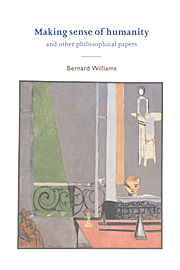Book contents
- Frontmatter
- Contents
- Preface
- I Action, freedom, responsibility
- II Philosophy, evolution, and the human sciences
- III Ethics
- 13 The point of view of the universe: Sidgwick and the ambitions of ethics
- 14 Ethics and the fabric of the world
- 15 What does intuitionism imply?
- 16 Professional morality and its dispositions
- 17 Who needs ethical knowledge?
- 18 Which slopes are slippery?
- 19 Resenting one's own existence
- 20 Must a concern for the environment be centred on human beings?
- 21 Moral luck: a postscript
- Index
21 - Moral luck: a postscript
Published online by Cambridge University Press: 28 January 2010
- Frontmatter
- Contents
- Preface
- I Action, freedom, responsibility
- II Philosophy, evolution, and the human sciences
- III Ethics
- 13 The point of view of the universe: Sidgwick and the ambitions of ethics
- 14 Ethics and the fabric of the world
- 15 What does intuitionism imply?
- 16 Professional morality and its dispositions
- 17 Who needs ethical knowledge?
- 18 Which slopes are slippery?
- 19 Resenting one's own existence
- 20 Must a concern for the environment be centred on human beings?
- 21 Moral luck: a postscript
- Index
Summary
When I introduced the expression moral luck, I expected it to suggest an oxymoron. There is something in our conception of morality, as Thomas Nagel agreed, that arouses opposition to the idea that moral responsibility, or moral merit, or moral blame, should be subject to luck. This is so, I still think, because the point of this conception of morality is, in part, to provide a shelter against luck, one realm of value (indeed, of supreme value) that is defended against contingency. However, there are some misunderstandings that I now think my formulations in Moral Luck may have encouraged.
One misunderstanding is fairly superficial. The conception of morality that has these associations is very well entrenched, with the result that if one says that there is a certain difficulty with (this conception of) morality, one may be taken to mean that the difficulty must arise with (any) morality; that is to say, with any scheme for regulating the relations between people that works through informal sanctions and internalized dispositions. One way of getting around this, which I have suggested more recently, is to use the words ethics and ethical in the more general sense, reserving the term morality for the local system of ideas that particularly emphasizes a resistance to luck. (The emphasis that this system places on resisting luck is connected with other characteristics, such as its insistence that the conclusions of moral reasoning should take the form of obligations.) The suggestion that we might use these words in this way has hardly, as yet, swept all before it, and it no doubt has its own powers to mislead, but I will follow it here.
- Type
- Chapter
- Information
- Making Sense of HumanityAnd Other Philosophical Papers 1982–1993, pp. 241 - 247Publisher: Cambridge University PressPrint publication year: 1995
- 18
- Cited by



